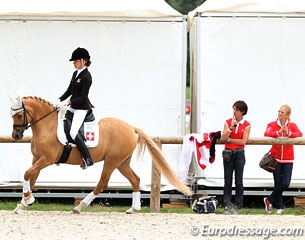
Having discussed the psychological hurdles that dressage riders face, it is time to look at what it takes to be the partner, mother, father, brother, or child, of an equestrian athlete.
My mum said that from the day she started riding, her father insisted that she wear a helmet for safety and would not let her near the horse without it. Mum knew, however, that the helmets in those days did nothing to support the head and fell off well before ground impact. What the helmet really did was make my grandfather feel a little better when watching his daughter galloping off on top of a wild animal.
At the local pony club you could always spot the parents who had never ridden, nor cared for a horse. They were the ones on the side of the arena in a fit of blind panic, or were often seen trying to tie the horse to moving objects, or asking their child for the tenth time if they felt ok. For the relatives that share a love of horses, it can be equally as difficult, as they know the love/risk balance that goes with owning your live athletic partner.
The fact is, that besides from the risk involved in our sport, the emotional depth that accompanies it, it can also be hard for those around us to put up with or understand, particularly for the non-horse loving (or horse petrified) relations.
With a Ph.D. in Counselling Psychology and a specialization in Sport Psychology, Seana Adamson has been training dressage and event horses for over 30 years, and knows that there are both pros and cons to having a partner (or other family members) who are involved with horses.
"At its best it can be a relationship of support and encouragement, a shared passion, and a way to enjoy time together," Adamson explained. "At its worst it can become a source of constant stress, resentment and worry."
As these persons typically deal with unique emotions due to the danger/degree of stress associated with dressage, Seana acknowledged that it can be extremely difficult for family members to deal with both the physical and mental stress of equestrian sports.
"First of all, there’s this 1300 pound lump of unpredictable foolishness that their loved one is convinced they have to ride, regardless of weather it is a howling wind storm outside," she said. "Furthermore, we all know how dangerous horses can be, and the risk of injury can have potential family consequences."
For dressage in particular, Seana talks about the inherent tension of dressage, being a sport of fine detail, finesse, and control.
"It is often hard for a family member to know how best to be supportive, for instance in a competitive situation," she said. "Should they talk more, talk less, help more, or just go away?"
Feeling great compassion, particularly for non horsey family members, Seana knows that horse people can be so singular and obsessive with their passion for their horses, and that this drive can be hard to live with. The key to maintaining the sanity of both rider and said relative, is life balance.
"Diversity can be tremendously refreshing, and can lead to a strong and healthy relationship," she explained. "There are three basic ways a relationship may be structured. First, there is the couple who is attached at the hip. They do everything together, are utterly dependent on each other to function. They risk becoming stagnant and constricted in life. Then there is the couple who is too independent of each other. They have no common interests, and while the diversity may at first be refreshing, the independence may eventually create distance and lack of intimacy. And finally there is the couple who has “interdependence”. They have times where they operate separately, and times where they come together in common interests or activities. While a shared passion such as dressage can be a wonderful way to stay close, differing passions can be a wonderful source of new experiences and ideas."
Recognizing that the sport of dressage is not just a sport, Seana believes our passion is more like a lifestyle, and horsey, or non horsey supporters, should be encouraged to take an interest, or at the very least, not get jealous of the four legged other half!
"I encourage non-horsey partners to understand the great degree of discipline and time required to become a successful dressage rider," she added. "It is important that the family and partners do not take it personally when the horses are getting more than their fair share of time."
In addition, Seana advises that the non horsey partner can play an important role by helping us to see outside the stable wall.
"There is a big wonderful world out there and every serious dressage rider runs the risk of letting their world become too small, and their focus too narrow," Seana concluded. "It is important to get out of the barn every now and then, and leave the horses behind."
by Sarah Warne for Eurodressage
Related Links
Classical Training: The Psychology of Dressage, Coping with It All - Part I
Sport Psychology for Dressage by Seana Adamson
Classical Training Articles by Sarah Warne